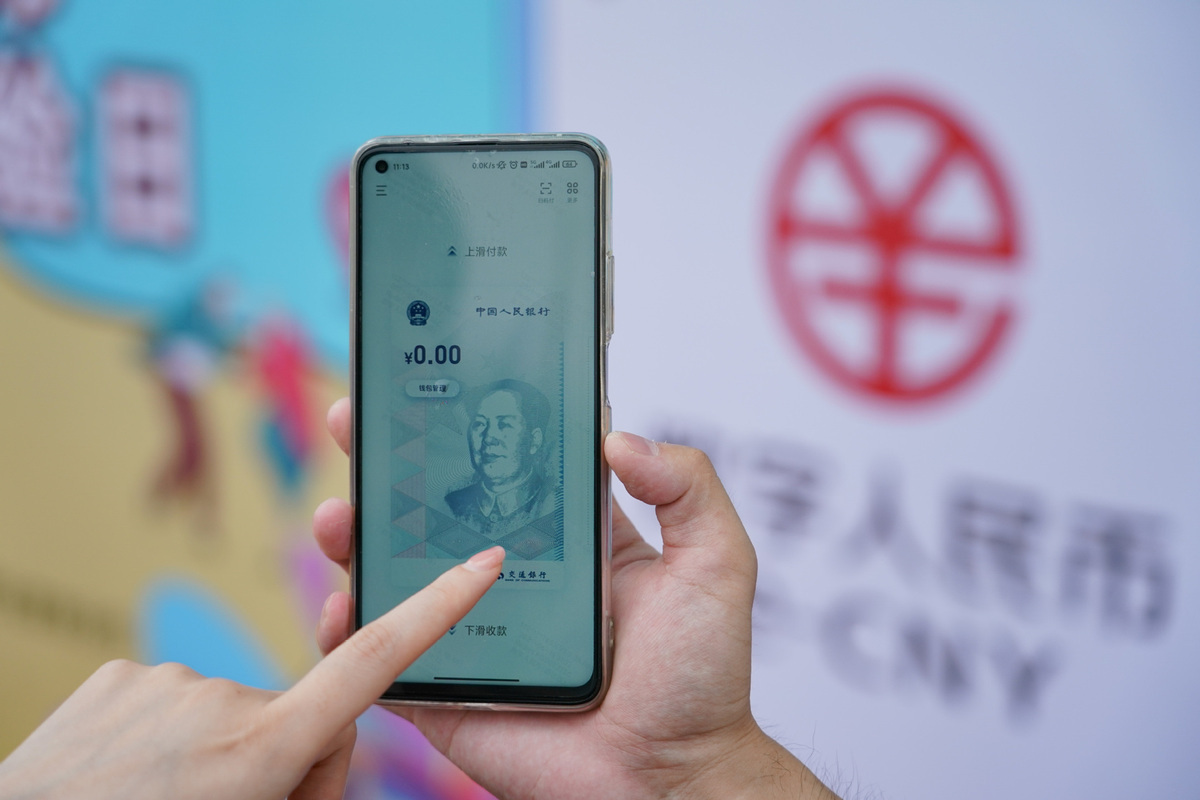

A staff member of the Bank of Communications Beijing Branch instructs a visitor to open a digital RMB wallet on a mobile phone on June 16, 2021. [Photo/Xinhua]
China has upgraded its digital renminbi payment services as part of the country's efforts to improve the profile of its digital currency and make the payment process more user-friendly for foreigners.
As mobile payment has become the dominant means of payment in China, such steps will offer foreigners a better experience during their visit to or stay in the country, experts said, adding that more measures are expected to further promote the digital fiat currency.
The newly launched "recharge before use" feature on the e-CNY app allows foreigners to replenish the wallet of the app using online services of global payment networks Visa and Mastercard.
Foreigners can also go to bank service outlets to recharge the digital RMB wallet with cash. If there is a balance left in the digital wallet afterward, it can be returned to the foreign bank card or account that was used for topping up.
Previously, foreigners in China could not top up their e-CNY wallets in advance. They could only do so on the spot when making payments.
The new function allows foreigners to use more convenient online payment methods, such as "quick pay", just like domestic users. Also, it shortens the payment duration, makes the operation simpler and smoother, improves payment efficiency, reduces waiting time due to foreign card verification and enhances the overall payment experience.
With the upgrade, foreigners can use their e-CNY wallets both at brick-and-mortar merchants capable of accepting the digital currency under trial programs and on online platforms such as ride-hailing app Didi, takeaway service provider Meituan, travel portal Ctrip and e-commerce platform JD.
Dong Ximiao, chief researcher at Merchants Union Consumer Finance, said that mobile payment services are not as widely used in most foreign countries and regions as in China.
The upgrade will not only create a more convenient payment environment for foreigners in China, but will also help test the e-CNY platform and promote the digital currency internationally, Dong added.
Zhou Maohua, an analyst at China Everbright Bank, said the upgrade will benefit foreigners and increase the presence of e-CNY in cross-border transaction scenarios, which will ultimately help promote the digital RMB and facilitate the internationalization of the currency.
China has been developing the digital version of the fiat currency since 2014 under trial programs.
As of May 31, around 264 million e-CNY transactions were made in trial regions, totaling 83 billion yuan ($11.4 billion), according to the People's Bank of China, the country's central bank.
Zhou Mi, a senior researcher at the Chinese Academy of International Trade and Economic Cooperation in Beijing, said that China always welcomes foreign consumers, and there is still room for improvement in areas such as cross-border payment.
In another development, Chinese financial technology company Ant Group introduced seven new leading digital wallets and payment apps from Asia to the Chinese mainland, bringing the total number of overseas digital wallets accepted on the mainland to 10.
The company said that users of overseas digital wallets, such as HiPay of Mongolia and Changi Pay of Singapore, will be able to use their domestic mobile e-wallets to enjoy a seamless payment experience on the mainland across Alipay's vast merchant network.
China has launched a new pilot program to allow eligible enterprises greater access to overseas financing in support of green and low-carbon transformation projects, the country's foreign exchange regulator said on Aug 21.
To further streamline the experience, China is expanding tax refund stores, broadening the range of refundable goods, and refining refund procedures, ensuring an efficient and seamless shopping experience for global visitors.